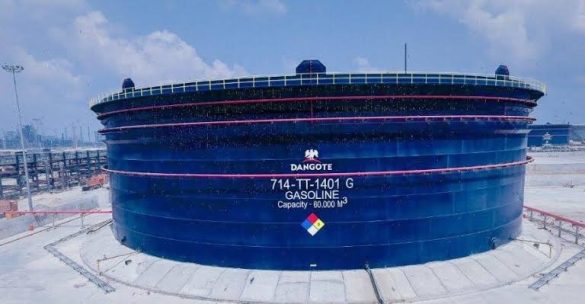KEY POINTS
- Dangote denies reports of petrol unit shutdown, calling them “fake news.”
- Refinery output climbs, reshaping global gasoline trade and reducing Europe’s exports to West Africa.
- Facility targets 700,000 bpd by year-end as Nigeria seeks higher crude output.
Following reports that suggested repairs could take months, Dangote Petroleum Refinery has denied claims that its gasoline unit was forced into a protracted shutdown, calling the rumors “fake news.”
The explanation followed Reuters’ report, which cited energy intelligence firm IIR Energy, that the refinery’s residue fluidized catalytic cracking unit (RFCCU) had been offline since August 29 because of a catalyst leak, with repairs potentially taking two to three months.
The $20 billion Lagos-based complex, which aims to revolutionize Nigeria’s fuel supply chain, includes the 204,000 barrels per day unit as a key element.
Anthony Chiejina, a spokesman for the Dangote Group, responded by claiming the reports were false. “Fake news. Why ‘could’ if they are sure?” he told Nigerian newspaper The PUNCH, questioning both the accuracy and intent of the claims.
Output growing as refinery reshapes global fuel trade
The 650,000-bpd refinery has already disrupted international trade flows since it went onstream in January 2024. As Nigeria starts to rely more on domestic supply, gasoline exports from Europe to West Africa have drastically decreased, from roughly 200,000 barrels per day in 2024 to 120,000 barrels in the first half of this year, according to Kpler data. This year, the refinery shipped two cargoes of gasoline to the East Coast, marking its entry into the US market.
By December, Dangote wants to ramp up to 700,000 bpd. In August, the refinery began importing Ghanaian Sankofa crude, a medium-sweet grade that is heavier than the light-sweet crudes it has primarily processed, in an effort to diversify its feedstock.
“This marks a notable shift driven by ongoing challenges in securing local barrels and the cost competitiveness of US WTI crude,” Kpler said, underscoring the facility’s flexibility.
Current throughput is estimated at 445,000 bpd, or 68% of total capacity—up from 400,000 bpd earlier this year. Analysts expect stable operations in the coming months, with a modest dip projected during routine maintenance scheduled between December and January.
The refinery’s rising demand has increased pressure on Nigeria’s upstream sector. Minister of State for Petroleum Resources Heineken Lokpobiri has stressed the need to ramp up local crude production to meet both domestic refining and export needs.



